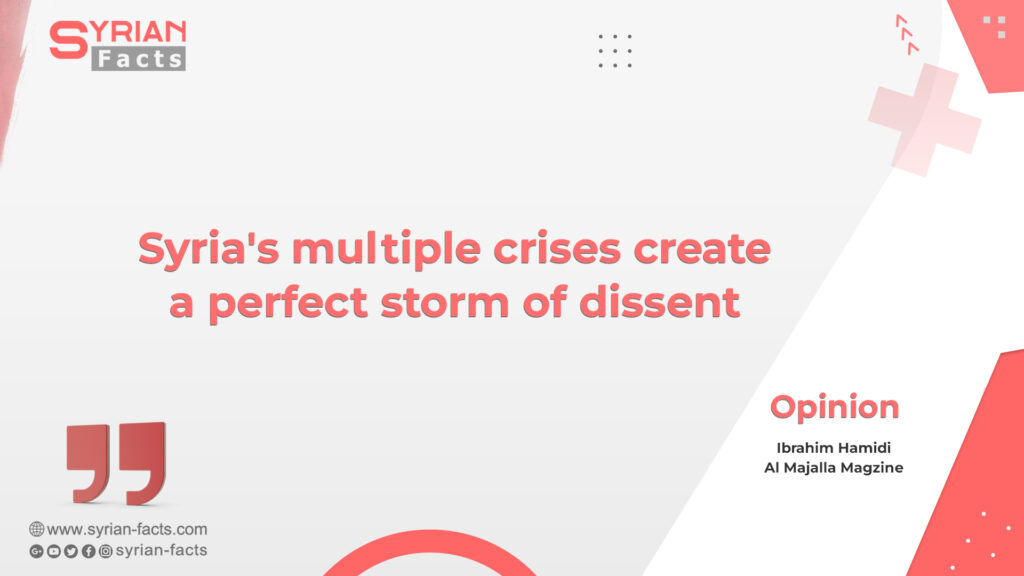Syria’s “forgotten” crisis is back in the headlines as it is currently experiencing several indirectly related developments.
To begin with, Syria — especially in the government-controlled areas — is undergoing a series of transformations, some of which are unfolding for the first time. At the same time, the Syrian economy is deteriorating at an unprecedented rate.
The government has lifted subsidies on many or most basic goods; the exchange rate of the Syrian pound against the US dollar has dropped to a new low; and President Bashar al-Assad raised or doubled salaries, but inflation has eaten away at any increases.
So, the number of people affected has grown, leading to a new segment of society falling below the poverty line, which previously included more than 90% of Syrians. The suffering has also affected countless merchants, some “war merchants”, and what remains of the poor and middle class.
Protests erupt in regime strongholds
In light of this confluence of factors, people living in regions under government control, commonly referred to as “regime strongholds” are protesting.
The protests unfolding along the Syrian coast mark a significant shift. Protest pamphlets have been distributed in coastal towns with significant Alawite populations and statements have been circulated on social media.
The statements mostly decry the deterioration of living standards, but some also touch on political issues. In response, authorities have made several arrests, with reports suggesting that at least 70 people have been detained.
Simultaneously, protests have also surfaced in the predominantly Druze city of Suweida. Similar protests have erupted in this province which holds an unofficial “special status” in the past few years. This status encompasses military, administrative, and service dimensions, permitting such protests to occur with minimal repercussions.
Nonetheless, a fresh wave of protests has emerged this time, driven by worsening living conditions and a perceived impasse on the political front.
The protests come on the heels of increasingly vocal criticisms against the regime being levied by loyalists in Damascus and other cities — both on the streets and on social media.
Geopolitical tensions
Tensions are also rising in two regions outside of al-Assad’s control— not tied to living conditions as these areas are relatively in better economic shape than Damascus but tied to geopolitical games.
Russia has downed American drones in these areas as part of an indirect escalation tied to the ongoing war in Ukraine. This antagonistic approach seems to be more about sending messages rather than engaging in direct military confrontation which neither side has the appetite for.
In Syria’s north, an escalation between Damascus and Ankara is unfolding through clashes between government-controlled areas and opposition-held regions. On its part, Israel has also stepped up its air strikes on “Iranian sites” in Syria.
Setbacks in Arab normalisation
Against the backdrop of these rising economic and military tensions in Syria, Arab normalisation efforts with Damascus have also hit a roadblock.
During the recently-held Arab ministerial meeting in Cairo discussions between the foreign ministers of Arab states and Faisal Mekdad the Syrian foreign minister, revealed a significant disparity and sluggish progress.
Mekdad reluctantly agreed to receive a copy of the Arab-Jordanian paper titled “Steps for Steps” from Jordanian Foreign Minister Ayman Safadi. This paper outlined what was offered to Damascus and the corresponding expectations.
Within the document, commitments were made to ease Western sanctions on Damascus if political reforms are implemented in the upcoming parliamentary elections, preceding the meetings of the Constitutional Committee. Mekdad begrudgingly accepted the document on the condition that it was not considered binding.
Against this bleak backdrop, the benefits of Arab engagement have yet to fully materialise, and sanctions will persist, which means that there will be no immediate improvement in living conditions.
Therefore, protests will escalate to include new actors — all waiting for a miraculous turn of events or an unexpected development.
Al Majalla Magzine









Be the first to write a comment.